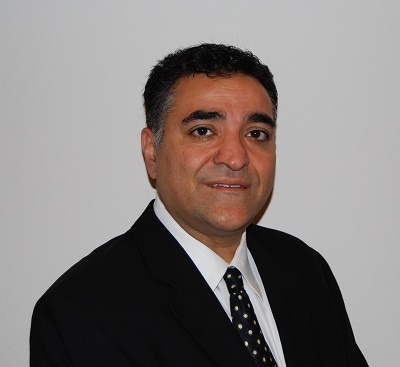Solyman Ashrafi is vice president of product management at MetroPCS and is on the LTE North America advisory board. He is speaking on the Voice over LTE track on Day Two of the LTE North America 2012 conference, taking place on the 14-15th November 2012 at the Fairmont Dallas Hotel, Texas. Ahead of the conference we speak to him about where MetroPCS is with its VoLTE deployment and what the challenges it expects to face in the future.
September 20, 2012

Solyman Ashrafi is vice president of product management at MetroPCS and is on the LTE North America advisory board. He is speaking on the Voice over LTE track on Day Two of the LTE North America 2012 conference, taking place on the 14-15th November 2012 at the Fairmont Dallas Hotel, Texas. Ahead of the conference we speak to him about where MetroPCS is with its VoLTE deployment and what the challenges it expects to face in the future.
What have been the main developments for you over the last 12 months with regards to LTE?
In early August MetroPCS reached another innovation milestone by announcing the world’s first commercial launch of Voice over LTE (VoLTE) services, the availability of the world’s first VoLTE-capable handsets, and the first sale of a VoLTE-capable handset.
The addition of VoLTE capabilities to MetroPCS’ 4G LTE handsets is transparent to consumers as they continue to enjoy all the voice and 4G LTE data services with which they are already familiar. Calls to and from the handset will use VoLTE, regardless of the handset or network used on the other end of the call.
MetroPCS was the first US carrier to deploy a commercial 4G LTE network in September 2010 and has since built out its 4G LTE network to cover roughly 90 per cent of its CDMA footprint. In addition to these milestones, MetroPCS is focused on developing and deploying Rich Communications Services (RCS) later this year. RCS is based on a worldwide standard that is being widely adopted by mobile operators as a way to deliver enhanced communications services, but in a much more personalised and simplified way. RCS will further differentiate premium 4G LTE services from competitors’ 3G data services.
Once launched, MetroPCS customers with RCS will have a feature set available to them that has immediate value with a unified user experience. Consequently, RCS enables MetroPCS to provide even more value to our customers and distance ourselves significantly from MVNOs and other operators that do not offer such services.
In what way has moving to VoLTE benefited you?
We believe our implementation of VoLTE will have a strong impact for our customer base. It enables us to migrate our customers to our 4GLTE network, achieve spectral efficiencies and increase capacity to enhance the overall 4GLTE experience, especially with a diverse portfolio of smartphones and new services such as RCS.
What is the significance of Rich Communications Suite both for your network and for your customers?
We are an industry leader in the deployment of VoLTE cable handsets, since VoLTE is the foundation for us to reform CDMA spectrum for LTE service. Likewise, the RCS platform, or our move to IMS, will bring about substantial changes for consumers. With RCS consumers will have a unified and natural way to connect to friends, family and networks in real-time and an easy way to share their content, files, photos and video while on a phone call—and just with one click.
In addition to this, we will roll out enhanced RCS services such as: Enhanced phone book with presence and service capabilities; extended presence information including geolocation, service capabilities and 1:1 or 1: many instant multimedia messaging that will be enhanced by image, media and file sharing. Other innovative service and capabilities will be offered once inter-carrier collaboration begins.
Net neutrality remains a contentious issue and has recently been enshrined in law in the Netherlands. What is your stance on this?
As far as the US is concerned MetroPCS has long been a mobile operator dedicated to delivering affordable and innovative wireless services at a price consumers can afford. So in fact, we have proven that we are pro-consumer, pro-competitive with our 4G LTE mobile services.
Is there enough innovation occurring in the mobile network industry? Can you provide some examples?
Changes to the core mobile network can be an expensive and slow process. Nevertheless, the initial success of OTT applications demonstrates the power of enabling innovation from the independent developer community. We believe that this sort of success is just the beginning and with innovative steps we’re taking with VoLTE and RCS, we are well positioned to drive the mobile experience even further and at an accelerated pace.
What are the main challenges you expect to face in the future?
Being innovators in any new technology comes with many benefits as well as challenges. While innovation can be very important for company success, it is also possible to be too innovative, too early. In the case of RCS, given what we believe other operators have expressed about their commitment to deploy RCS, we see the inter-carrier collaboration as a vital piece for RCS to take hold on a mass scale in the U.S.
The LTE North America conference is taking place on the 14-15th November 2012 at the Fairmont Dallas Hotel, Texas. Click here to register your interest.
Read more about:
DiscussionAbout the Author(s)
You May Also Like








.png?width=300&auto=webp&quality=80&disable=upscale)


_1.jpg?width=300&auto=webp&quality=80&disable=upscale)


.png?width=800&auto=webp&quality=80&disable=upscale)